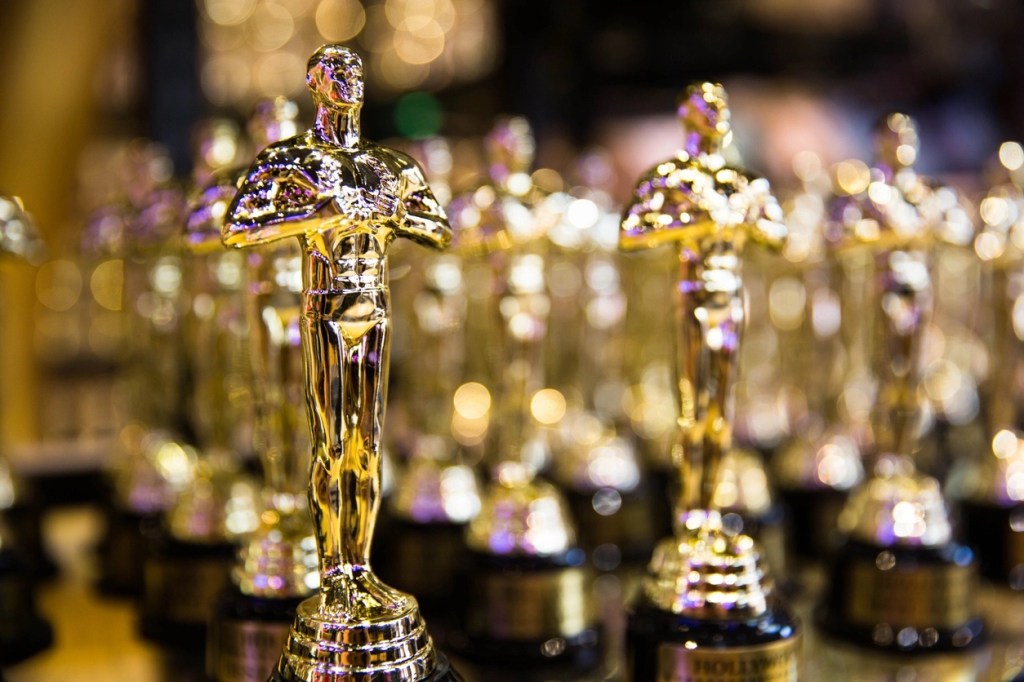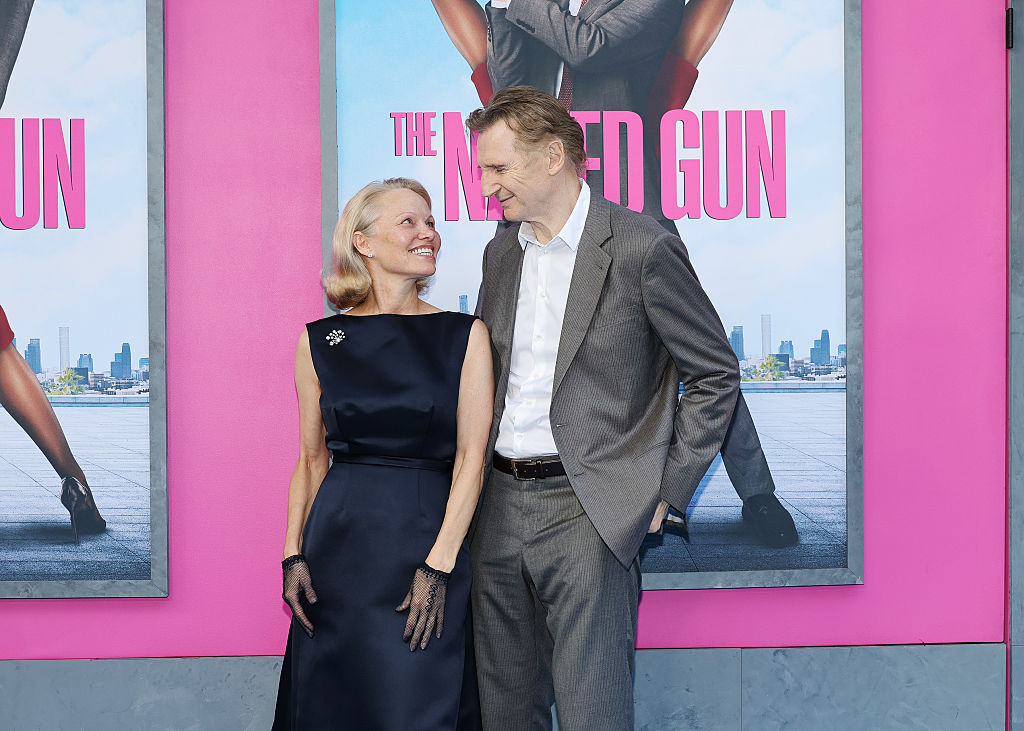Is anyone actually watching the Oscars anymore? Until “The Incident” between Messrs Smith and Rock last year the direction of travel was clear. Between 2014 and 2020 the televised Academy Awards lost almost half their viewers, the number falling from 43 to 23 million. This year, in March, they were at 18 million with punters only tuning in perhaps to see some bitch-slapping between Cate Blanchett and Meryl Streep.
As the importance of cinema has dwindled, the po-faced self‑importance of the film industry has grown
The first Oscars were presented in front of 270 people with tickets costing $5 and a ceremony which ran for fifteen minutes; now it’s — as the 1979 host Johnny Carson quipped — “two hours of sparkling entertainment spread over a four-hour show.” This may be classic over-compensation; in 1930, 65 percent of Americans went to the cinema weekly, while now it’s less than a tenth.We still watch films, of course, but no longer in reverent silence in public places of worship; instead we mock them, pause them, talk over them and sexually gratify ourselves over them in the privacy of our homes. Modern film stars know this; it stings to be merely a component of an evening’s entertainment alongside Uber Eats.
As the importance of cinema has dwindled, the po-faced self‑importance of the film industry has grown. Now the Academy of Motion Picture Arts and Sciences has announced that from next year films will not be nominated for Best Picture unless they meet two out of four rules listed here. These rules include featuring more actors from minority ethnic groups, more female lead characters, having visible “hard of hearing” actors and crew — and having LGBTQ interns.
No one wants to go to the cinema to watch a bunch of over-privileged white folk indulging themselves — that’s what we have the televised Oscars for. But things have been changing for a while. This year’s Best Picture starred Michelle Yeoh leading a majority Asian cast; last year’s centered around a deaf family, 2021’s starred Frances McDormand suffering bravely without male company while 2020’s Parasite concerned the problems of two South Korean families. But it’s the box-ticking aspect which sits so uneasily in an allegedly creative industry. On this criteria, The Godfather couldn’t have won Best Picture; neither could Schindler’s List, Jews now being considered to enjoy white privilege, even though two thirds of European Jewry was murdered for being of this racial group. All The President’s Men — why not call it All The President’s Women? Best Picture of 1939 Gone with the Wind featured black actors — but it was a sickeningly racist romp. Best Picture of 1947 Gentleman’s Agreement had a white cast — but it was a stirring condemnation of racism.
One actor, Richard Dreyfuss, has responded with great gusto to this latest bout of Olympian finger-wagging: “This is an art form. It’s also a form of commerce, and it makes money. But it’s an art,” he said on PBS:
“And no one should be telling me as an artist that I have to give in to the latest, most current idea of what morality is. And I’m sorry, I don’t think that there is a minority or a majority in the country that has to be catered to like that.”
Or as David Cox wrote in The Spectator in 2019, “This is not the first time that cinema has subordinated aesthetic endeavor to promoting the ideology of the ruling elite. Yet now it is not supporting the war effort, or plugging the GPO’s mail service. It is insidiously advancing identitarian attitudes that threaten to deepen social division. For that, it deserves no awards.”
We call it the Golden Age of Hollywood for a reason. In the 1930s and 1940s motion pictures were run by barely-literate men — many still speaking with accents after their families fled anti-Jewish pogroms in other countries — who nevertheless tapped into the hopes and fears of the American proletariat. They had no illusions about themselves; they were of the people, for the people, but gave no preferred status to their own people. As Harry Cohn told the pretty blonde actress Judith Tuvim when he changed her name to Judy Holliday: “I make films by Jews, for Jews — but not with Jews.” Thus Betty Perske became Lauren Bacall and Jacob Julius Garfinkle became John Garfield.
The modish saying “You have to see it to be it” is really quite insulting — and inaccurate. Rosa Parks never saw another black person on an Alabama bus refuse to give up their seat to a white passenger. Malala Yousafzai had never seen a twelve-year-old girl take on the Taliban. And the same is true of Hollywood. When Salma Hayek arrived there at the age of thirty, she didn’t look like the popular female film stars of the time — cheeky Ryan and impish Ryder. She spent years struggling to find work, once being told that her accent was heard mainly from housekeepers. But rather than sit around claiming a place on the Victimhood Olympic podium, she went out and changed the way Latina actors are viewed. If a young actor from an underprivileged minority sees people who get to the top on merit — Halle Berry, Jennifer Lopez, even Will “Slugger” Smith — how much more inspiring than knowing they were there as part of a quota, being condescended to by whitey in his wisdom.
It’s understandable that black actors are angry about not working as much as they should. But Thespis is a cruel master; actors of all hues have a mind-blowing 95 percent unemployment rate. It’s understandable that a systemically racist — and even more systemically sexist — industry might want to cover its tracks by rewriting history. But as the recent brouhaha over Queen Cleopatra showed — when Egyptians were indignant that their Greek queen was being played by a black Englishwoman — a heavy-handed desire to make posthumous amends can make the situation worse. Though Bridgerton looks lovely, I find it creepy that it portrays its black characters dressed in silks and having a lovely time when they most conclusively were not. It’s our old chum Magical Thinking which says that women can be men — and that Regency-era black Britons were rich and powerful. How is that progress?
No one with half a brain wants to return to the time when white actors slapped on the black panstik in order to play Othello, though if someone can explain to me why drag — womanface — is so celebrated while blackface is rightly shunned, I’d be eternally grateful. But will this new authenticity extend to the class prejudice? Will only working-class actors be playing working-class characters? I do hope so, but I think not; 60 percent of British Oscar-winners over the past twenty-five years have been privately educated, whereas only 6 percent of the population have had the privilege.
The film stars of the Golden Age were generally of working-class origin; perhaps because of their humble backgrounds, they tended to be genuinely political, rather than posturing narcissists. Marilyn Monroe was under surveillance by the FBI for talking openly about her support for black civil rights. The Committee for the First Amendment — starring Bacall, Bogart, Garland, Kelly and Kaye — flew on a plane, tauntingly called Red Star, to take a petition bearing 500 prominent industry names to Washington in defiance of the witch-hunts. But these stars — maverick freethinkers in a right-wing Hollywood — were risking their careers by going against the grain. They weren’t standing there in their $25,000 dresses, telling us how awful rich people are. Gwyneth Paltrow has not only famously claimed that being a film star is tougher than doing a “regular” job, but also that reading nasty things about herself and her friends was “almost like how, in war, you go through this bloody, dehumanizing thing.” It’s odd how a bunch of woke liberals conscious of white privilege can be so unconscious of having the greatest privilege possible — doing something one loves for a living.
It ill behoves Hollywood — the most venal and exploitative workplace ever invented — to tell the rest of us how to behave. The sight of individuals who had the same chance as everyone else to become nurses or firefighters — but chose instead to go into a business that is about playing pretend and reaping vast financial rewards for it — lecturing the rest of us on how to be good people would be offensive if it wasn’t so funny. It took a Brit — Ricky Gervais at the Golden Globes in 2020 — to cut these preposterous poseurs down to size. After sitting through speeches by Jennifer Aniston on climate change and Patricia Arquette on US/Iran relations, he announced “You know nothing about the real world. Most of you spent less time in school than Greta Thunberg… If you do win an award tonight, don’t use it as a platform to make a political speech.”
When Jodie Comer accepted the BAFRA award for Best Actress in 2019, the way she spoke was more shocking to many than anything she had done in her three years of playing Villanelle, the cold-blooded assassin in Killing Eve. She spoke like the working-class girl she is — a Liverpudlian with a broad and beautiful Scouse accent. “Coming from a working-class background, there is the notion that you are going to have to work much harder to be successful,” she has said. Social mobility has been reversing in Britain for some time now — especially in the fun, easy, well-paid careers that the entertainment industry provides. Journalism, modeling, music and especially acting — all have fallen to the spawn of the rich and/or famous. Soon showbiz will be like the monarchy; you’ll either need to be born into it or marry into it. And no amount of well-meaning Oscar quotas will fix that.
This article was originally published on The Spectator’s UK site.

























